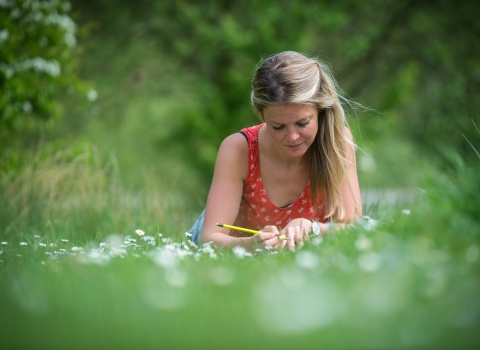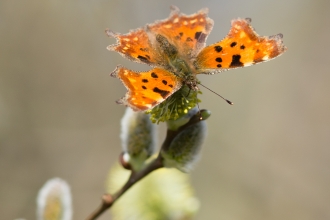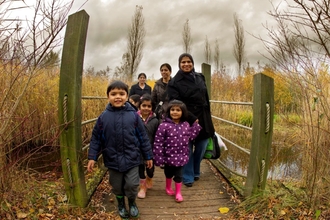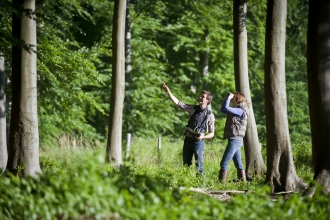Gift in Wills to the Wildlife Trust for Bedfordshire, Cambridgeshire and Northamptonshire
Why do people leave a gift in their Will to The Wildlife Trust for Bedfordshire, Cambridgeshire and Northamptonshire?
People choose to leave gifts in their Will to The Wildlife Trust for Beds, Cambs and Northants for various reasons. For many, it is a way to give back to wildlife after a lifetime spent enjoying it, and to ensure that nature continues to thrive for future generations to enjoy too. Some choose to leave a gift as a way of honouring a loved one who cherished our natural world, or as a dedication to someone inspired by our conservation work. Whatever your reason, your gift will make a lasting impact for the wildlife within our three counties.
How might the Wildlife Trust BCN use my gift? Can I decide?
At the Wildlife Trust BCN, gifts in Wills have benefitted all three of our counties, various types of wildlife and habitats, and all aspects of our work. Gifts in Wills of all sizes have a significant impact and make much of our work possible, creating a wilder future for our region.
For more information and to read examples of how gifts in Wills have previously been used, please visit our ‘How we would use your gift’ page.
When receiving a gift in a Will, the Wildlife Trust BCN uses this in a way that nature needs it most, assessing both short- and long-term need. We always try to consider the interests of the donor and honour their personal wildlife passions through the project(s) their gift supports, wherever possible.
However, you can specify in advance how you’d like your gift to be used, this is called a ‘restriction’. This can be a broad restriction, such as a specific county or habitat, or a more specific restriction, such as a particular project. We try to honour these wherever possible, however we suggest you discuss any restrictions with us in advance of making or updating your Will as we may know of reasons why this would not be possible to fulfil.
How do I include a gift to the Wildlife Trust BCN in my Will?
To include a gift to the Wildlife Trust BCN in your Will, you will need to provide your solicitor or professional will-writer with the following information:
Registered Charity Name: The Wildlife Trust for Bedfordshire, Cambridgeshire and Northamptonshire
Registered Charity Number: 1000412
Registered Charity Address: The Manor House, Broad Street, Great Cambourne, Cambridge, CB23 6DH
Your solicitor or professional will-writer will then ask what gift you would like to include and talk through the options with you (see question below). If you have already made a Will, you can add a gift to the Wildlife Trust BCN by using a Codicil. However, Codicils may not always be suitable, so please consult a solicitor or professional will-writer for advice.
What types of gifts can I leave to the Wildlife Trust BCN in my Will?
After ensuring your Will provides for your loved ones, in the way you wish for it to, you can also include a gift to the Wildlife Trust BCN. These gifts can be made in the following ways:
Percentage – This is officially called a ‘residuary gift’. You are able to gift a percentage of the leftover value of your estate (your combined money, possessions, and property), after your debts, expenses, taxes, and any fixed sum or specific gifts have been settled, including any to your loved ones. As a percentage, these gifts are safeguarded from rises in inflation and make sure your gift has the maximum impact you intended.
Fixed sum – This is officially called a ‘pecuniary gift’. You are able to gift a fixed sum of money, e.g. £5,000. Inflation can chip away at the value of these gifts so it is advised to update your Will regularly or index-link cash gifts so the amount you have pledged keeps its value over time and achieves your desired impact.
Specific gifts - Your Will can include gifts of specific items, for example, artwork, books, or investment shares. If you’re considering leaving a gift of this kind, please be aware that, unless we are able to make direct use of the gift, we will instead raise funds from their sale and this can take a considerable length of time for us to process. If you wish to leave land as a gift, please see the question below.
Do you accept gifts of land?
Land given to the Wildlife Trust BCN by generous donors has played a significant role in protecting land for wildlife in the past. However, the Trust isn’t always in a position to accept the gift of land, particularly where the costs of maintaining it are disproportionate, or because there are restrictions on the land that prevent us from making the best use of it for wildlife.
Larger areas of land, sites next to existing nature reserves, and areas with high ecological value, are most likely to fit with the Trust’s objectives. However, in some cases, smaller areas that can reconnect habitats, or can be maintained for wildlife with low inputs, can be highly valuable for wildlife. We would therefore advise anyone intending to give us a gift of land in their Will to discuss it with us in advance. Please contact our team for more information.
Should I tell you that I’ve included a gift?
We know your Will and finances are a deeply personal matter and it is entirely your own choice whether you inform us about including a gift or not.
If you do choose to tell us, we will treat this information in confidence and maintain contact with you in a way that suits you. If you are happy to continue hearing from us, we will invite you to exclusive events that enable you to engage with nature and see our reserves in new and exciting ways. We will also keep in touch via an annual newsletter, and our friendly legacy team will be your point of contact for any questions.
Making or Updating a Will
Why do I need a Will? What happens if I die without one?
According to research, the most reported reason for not having a Will is that people have not got around to it yet, followed by believing they are too young or don’t have anything to give.
However, if you don’t have a valid Will, standard rules defined by law will be used to dictate how your money, possessions, and property (known collectively as your ‘estate’) are divided when you die. Without a Will, you also have no say over who is responsible for sorting the legal proceedings that are required.
These standardised rules won’t consider any of your personal wishes and can mean that those you intend to inherit your estate, such as a long-term partner, may receive nothing. Dying without a Will can create significant difficulties and disputes for your loved ones.
Who should write or update my Will?
There are many different options when it comes to writing your Will. These differ in price but also, importantly, in their level of regulation and their suitability for your specific needs. It can only take one mistake for your Will to become invalid, and the more complex your personal circumstances the more advice and guidance you should seek. We highly recommend that you use a solicitor or professional and regulated Will-Writer to write or update your Will. This will ensure it is validly written and witnessed, giving you the most peace of mind.
The Law Society website provides a list of impartial solicitors in your area.
When should I write or update my Will?
Anyone over the age of 18 can have a Will, and it is advisable to do so. However, there are specific life situations which make it particularly wise to write, or review and update, your Will to ensure it reflects your wishes and personal circumstances. These situations include:
- Entering a marriage or civil partnership – in England and Wales this revokes any previous Wills.
- Entering or ending committed relationships that aren’t legally recognised by marriage or civil partnership.
- Getting divorced or separating.
- Having children – not only can you provide for them financially, but your Will can determine who would become their guardian if you were to die whilst they were under 18.
- The death of someone included within your Will.
- Other complex family or relationship circumstances, such as complications relating to someone included within your Will (e.g. disability, vulnerability, debt or divorce) or the breakdown of a relationship.
- Moving home, entering a joint ownership of a property, or buying property oversees.
- Acquiring assets overseas.
- Changes in financial circumstances.
- Changes in the law which could mean an arrangement made several years ago could no longer be necessary or meet your needs.
- Selling or parting with a possession that was included as a specific gift in your Will. Otherwise, the gift of the item is void and your intended recipient will not receive anything as an alternative.
- Decisions about, or changes in, your funeral preferences – funeral instructions can be included in a Will so that your family don’t have to make these difficult decisions.
What are executors and how do I choose them?
Executors are individuals you name in your Will to manage the required processes after your death. They should be competent and capable, but they do not need professional qualifications. Your executor can be someone who is due to inherit something from you in your Will (a ‘beneficiary’), but they do not have to be.
The executors could be:
- Family Members: Relatives who are trustworthy and reliable.
- Friends: Close friends who understand your wishes.
- Professional Advisers: Solicitors, professional will-writers or accountants who can provide expertise.
- Trust Corporations: Organisations that can handle complex estates.
If you choose professional advisers or a trust corporation, they should inform you about the likely costs involved.
You must discuss this role with your executor before selecting them to ensure they understand and are comfortable with the responsibility.
At the Wildlife Trust BCN, we do not offer the option for us to act as an executor to a Will.
Where should I store my Will?
Your solicitor or professional will-writer may offer to keep your original Will as part of their service. Ensure you also keep a copy alongside any other useful information, like pension and bank account details, as this will help your executors to fulfil your wishes.
What is inheritance tax, is it relevant to me, and how would a gift to charity impact this?*
Inheritance tax is not relevant to everyone and depends on whether the total value of your money, possessions and property (your ‘estate’) is over a certain threshold, as set by the government. If your estate is worth more than the threshold, you will have to pay inheritance tax on the amount that exceeds this threshold, deducted from your estate after you die. Your solicitor or professional will-writer will be able to advise you on how much this is likely to be.
The current threshold value can be found on the HMRC website, or your solicitor/professional will-writer will advise you on this. This threshold amount may change in the future, and there are exemptions and benefits available to married couples and civil partners.
Gifts in Wills to charity are 100% tax-free, meaning the charity will receive the full amount you have specified, although we recommend you get advice on the correct wording of this if your Will includes a mix of charity and non-charity beneficiaries. If you are eligible to pay inheritance tax and give 10% or more of your estate to charity (after any debts have been deducted), the inheritance tax rate for the rest of your estate will be reduced from 40% to 36%. If this is something you may consider, we recommend speaking to a solicitor, professional will-writer, or to HMRC, for further advice and information.
*This answer and the figures given are correct as of September 2024. Please check HMRC for any changes.
Getting advice
I would like to talk to someone about making my Will and including a gift to the Wildlife Trust BCN, who do I contact?
For more information or to discuss your gift in confidence, please contact Hannah Collins in our Legacy Team by filling in our contact form, calling on 01954 713500 or emailing legacies@wildlifebcn.org.
Can you give me legal advice about making my Will?
While we’re unable to provide specific legal advice, we are happy to talk to you about how your gift could be used to protect wildlife and wild areas. We also recommend looking at the following links for more, up-to-date, advice:
Information on making a Will - Making a will - GOV.UK (www.gov.uk)
Search for local, professional solicitors - Home | The Law Society
Information on Wills and gifts to charity - www.rememberacharity.org.uk
Acting as an executor to a Will
I am the executor of a Will which includes a gift to Wildlife Trust BCN. What do I need to do next?
Please contact Rachel Hopper in our Legacy team on 01954 713500 or email legacies@wildlifebcn.org.
Gill Gent (1927-2018) cutting the cake as guest of honour of the Wildlife Trust BCN’s 50th anniversary event
Gill Gent (1927-2018)
Gill was Northamptonshire plant recorder for decades.
Gill’s botanical skills were incredible, but the most amazing thing about Gill was just how universally liked she was: the most incredibly patient teacher and advisor, giving up so much of her time to help others develop an interest in wildlife, particularly botany of course.
Gill’s encouragement of Wildlife Trust staff and volunteers over the years was unceasing.




